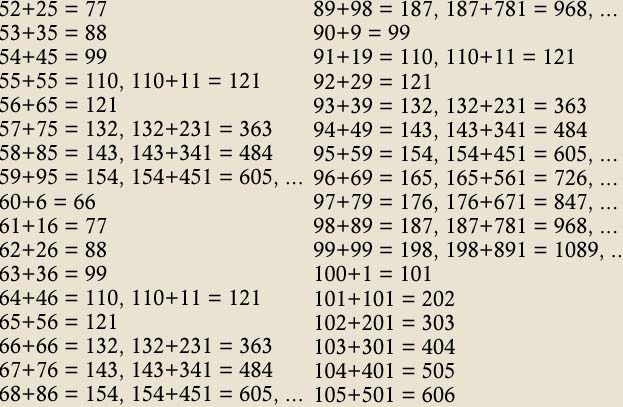
Lychrel numbers are natural numbers that do not (theoretically) ever become palindromes when you repeatedly reverse their digits and add it to the original. For example, the number 25 is clearly not a Lychrel number, as 25+52 = 77, and 77 is a palindrome. A large percentage of numbers are easily ruled out as Lychrel numbers, as they become palindromes in 1-2 steps. Some numbers, like 79, take a little more effort: 79+97 = 176, 176+671 = 847, 847+748 = 1595, 1595+5951 = 7546, 7546+6457 = 14003, 14003+30041 = 44044, finally a palindrome after 6 steps!
While I don’t believe that we have proved that any given number is indeed a Lychrel number, there are some numbers that after intensive calculation (i.e., trying 1,000s of iterations or more) simply don’t make a palindrome. These numbers are technically “Lychrel candidates,” and 196 is the smallest of them identified to date. (For those of you familiar with OEIS, the Lychrel candidates are A023108.)
In any case, there are some interesting number of steps that numbers require to be proven as “non-Lychrel.” For example, the numbers 60, 61, 62, and 63 all require just one iteration to become palindromes, and both 91 and 92 resolve to the same palindrome (91+19 = 110, 110+11 = 121 and 92+29 = 121.)
This week’s GeekDad Puzzle of the Week centers around the patterns that these steps counts make for consecutive counting numbers. What is the biggest run of consecutive steps counts (i.e., there are four numbers in a row from 60 to 63 that all take exactly one step) under 100,000? What is the biggest run of equivalent palindromes made (i.e., there are two numbers is a row that make “121” as their first palindrome) under 100,000? What is the longest sequence of steps (i.e., 5, 4, 3, 2, 1 or 1, 2, 3, 4, 5, etc.) found for consecutive counting numbers under 100,000 to make their first palindrome?
A quick note: For purposes of this puzzle, each number requires at least one step to reach a palindrome, even it starts as one. For example, 11+11 = 22, done! There are palindromes that are Lychrel candidates, i.e., 4994.
As always, please submit your answers via email to GeekDad Central. All correct (or at least reasonably well-reasoned) responses will be put into a random drawing for this week’s prize: a $50 Gift Certificate from our heroes over at ThinkGeek.
Good luck, and happy puzzling!



